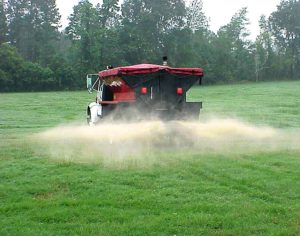Liquid Calcium: A substitute for what?
The transportation and application costs associated with limestone applications often exceeds the cost of the limestone by 10-30 times. When soil test recommendations call for three, four or even five tons per acre, the end cost can sometimes exceed $300 per acre. Increasingly producers are looking toward non-traditional approaches to battle low soil pH. Over the past several years, online ad posting have stressed the liquid calcium formulation marketed by company X or Y is many times more available than the calcium in limestone. In general, the ads do not claim to be a limestone substitute, but a source of soluble calcium. Many producers and even some agricultural retailers view these ads and are falsely guided toward believing that increasing plant available calcium will often or even eliminate the derogatory influence of low soil pH. A number of clientele have found that their liquid calcium treatment did not alter pH or improve their forage grass production.
What is liquid calcium?
The products are largely calcium chloride, one of the few highly soluble calcium minerals/salts. A few are calcium nitrate, also very soluble. Many soil testing laboratories will recommend calcium sulfate (gypsum) to producers who have limiting soil test calcium levels. Gypsum is easy to apply in a dry formulation, is not corrosive, will not significantly contribute to overall soil salinity, low cost and yet it’s solubility is fairly low, allowing for single applications to provide season long availability of calcium and some sulfur. Calcium chloride, calcium nitrate and calcium sulfate are all considered to be neutral salts, in that they will not directly raise or lower the soil pH.
Why do these soluble calcium sources not alter pH?
Before addressing this, the question of what is pH is in order. Soil pH, and all other pH measurements, is the relationship between the H+ cation and the –OH anion. At pH 7, the H+ and –OH equal each other. Now, why are these neutral salts? As calcium is introduced into the soil, the individual calcium cations will displace the soil acidity (+H) from the soil cation exchange sites, in face calcium will displace two H+ cations. The newly displaced +H acidic cations go into solution with the anion from the soluble calcium source, in this cases, either chloride, nitrate, or sulfate. Thus, in solution is hydrogen chloride, hydrogen nitrate and di-hydrogen sulfate, which we know as the strong acids; hydrochloric acid, nitric acid and sulfuric acid. Thus the introduction of soluble calcium only move the acidity, it did not “neutralize” the acidity.
What is required to neutralize soil acidity?
The acidity (H+) must be chemically transformed into a non-acid. In the case of limestone or dolomite, the carbonate anion reacts with two H+ cations to form a water molecule and a carbon dioxide molecule. In the case of lime (calcium oxide and calcium hydroxide), the oxide reacts with two H+ cations to form water, when hydroxides are present, one H+ cation reacts with one –OH to form water. In each of these cases, two H+ acidic cations are displaced off the soil cation exchange sites by either a calcium or magnesium cation and the H+ cations react with either a carbonate, oxide or hydroxide to form water and carbon dioxide in the case of limestone or dolomite.
The verdict, should I use liquid calcium products?
If your soil test results call for needed calcium, but your soil pH indicates no need for limestone/pH adjustment, then one of these liquid calcium products could provide a solution to your soil fertility needs. This scenario is uncommon in most of Texas, except for peanuts grown on very sandy neutral pH soils. However, if you soil pH is low and calls for the application of limestone, the liquid calcium described above are not a solution for your pH adjustment. In this case, the application of limestone and/or dolomite is the only broad scale method of adjusting your soil pH.
Tony Provin, Ph.D.
Professor and Extension Specialist
Texas A&M AgriLife Extension
Soil & Crop Sciences
College Station, TX
Ph: 979-845-4816
